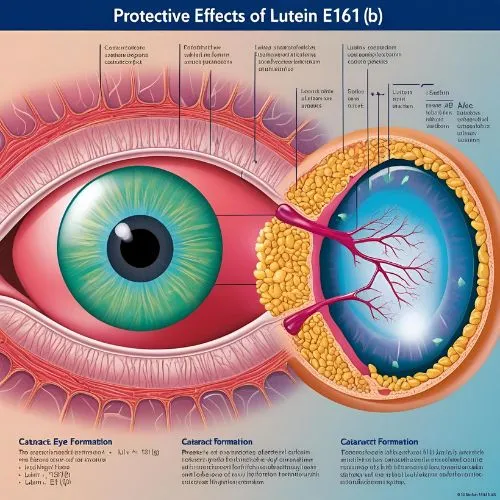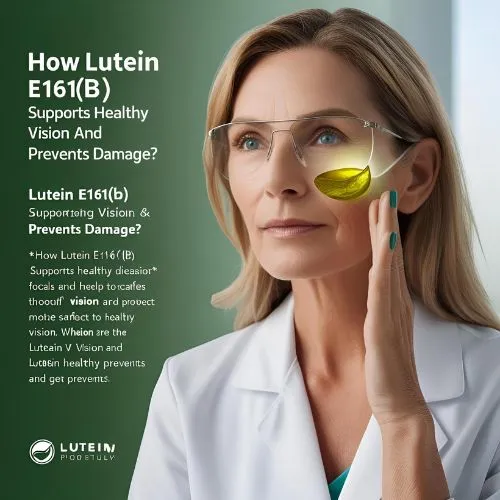Can Lutein E161(b) Help Prevent Cataracts and Vision Loss?
As we age, maintaining healthy vision becomes increasingly important. One natural compound that has garnered significant attention for its potential eye health benefits is lutein E161(b). This powerful carotenoid, found in various fruits and vegetables, has shown promise in protecting against age-related eye conditions such as cataracts and vision loss. In this comprehensive guide, we'll explore the science behind lutein E161(b) and its role in preserving eye health.\

The Protective Effects of Lutein E161(b) on Cataract Formation
Cataracts are a common age-related eye condition characterized by clouding of the eye's natural lens. This cloudiness can lead to blurred vision, decreased color perception, and increased sensitivity to glare. Lutein E161(b) has emerged as a potential ally in the fight against cataracts.
Antioxidant Properties of Lutein E161(b)
Lutein E161(b) is a potent antioxidant that plays a crucial role in neutralizing harmful free radicals in the eye. These free radicals can damage the proteins in the eye's lens, which may contribute to the development of cataracts. By effectively scavenging these damaging molecules, lutein E161(b) helps maintain lens clarity, supporting healthy vision and reducing the risk of cataract formation. Regular intake of lutein E161(b) can be beneficial for long-term eye health.
Lens Protection and Oxidative Stress Reduction
Research has shown that lutein E161(b) accumulates in the eye's lens, where it acts as a natural filter against harmful blue light. This protective action may help prevent oxidative damage to lens proteins, potentially slowing down the progression of cataracts. Additionally, lutein E161(b) has been found to enhance the antioxidant capacity of the lens, further bolstering its defenses against oxidative stress.
Dietary Intake and Cataract Risk
Studies have investigated the relationship between dietary lutein E161(b) intake and cataract risk. A meta-analysis of observational studies found that individuals with higher lutein E161(b) intake had a lower risk of developing age-related cataracts. While more research is needed to establish a definitive causal relationship, these findings suggest that incorporating lutein-rich foods or supplements into one's diet may be beneficial for long-term eye health.

How Lutein E161(b) Supports Healthy Vision and Prevents Damage?
Beyond its potential role in cataract prevention, lutein E161(b) offers a range of benefits for overall eye health and vision preservation.
Macular Pigment Optical Density
Lutein E161(b) is a key component of the macular pigment, a protective layer in the retina that filters harmful blue light and supports sharp central vision. By increasing macular pigment optical density (MPOD), lutein E161(b) may enhance visual performance and protect against age-related macular degeneration (AMD), a leading cause of vision loss in older adults.
Blue Light Filtration and Glare Reduction
The ability of lutein E161(b) to filter blue light is particularly relevant in today's digital age. Prolonged exposure to blue light emitted by electronic devices can contribute to eye strain and potential retinal damage. Lutein E161(b)'s natural filtering properties may help mitigate these effects, reducing glare sensitivity and improving visual comfort in high-light environments.
Visual Function Enhancement
Research has demonstrated that lutein E161(b) supplementation can lead to improvements in various aspects of visual function. These include enhanced contrast sensitivity, better glare recovery, and improved visual acuity under low-light conditions. These benefits may be particularly valuable for older adults experiencing age-related declines in visual performance.
Scientific Insights: Lutein E161(b) and Long-Term Eye Health
The scientific community continues to explore the potential of lutein E161(b) in promoting long-term eye health and preventing vision loss.
Age-Related Macular Degeneration (AMD) Prevention
Numerous studies have investigated the role of lutein E161(b) in preventing or slowing the progression of AMD. The Age-Related Eye Disease Study 2 (AREDS2), a large-scale clinical trial, found that supplementation with lutein and zeaxanthin (another carotenoid) reduced the risk of progression to advanced AMD in certain high-risk individuals. These findings underscore the potential of lutein E161(b) as a preventive measure against this sight-threatening condition.
Neuroprotective Effects
Emerging research suggests that lutein E161(b) may have neuroprotective properties extending beyond the retina. Studies have found associations between higher lutein levels and improved cognitive function in older adults. This cognitive benefit may be related to lutein's accumulation in brain tissue, where it could potentially protect against oxidative stress and inflammation.
Synergistic Effects with Other Nutrients
Lutein E161(b) appears to work synergistically with other eye-protective nutrients, such as zeaxanthin and omega-3 fatty acids. This interaction highlights the importance of a balanced approach to eye health, incorporating a variety of nutrients through diet or supplementation. Future research may uncover additional beneficial combinations to optimize eye protection and visual function.

Conclusion
The growing body of scientific evidence supports the potential of lutein E161(b) in preventing cataracts, supporting healthy vision, and promoting long-term eye health. While more research is needed to fully understand its mechanisms and optimal usage, incorporating lutein-rich foods or considering supplementation under the guidance of a healthcare professional may be a prudent step in maintaining eye health as we age. As always, a holistic approach to eye care, including regular eye exams, a balanced diet, and protection from UV and blue light, remains essential for preserving vision throughout life.
For more information on lutein E161(b) and other natural plant extracts that support eye health, please contact us at info@yanggebiotech.com. Our team of experts is dedicated to providing high-quality, innovative solutions to meet your dietary supplement and functional food needs.
References
1. Mares, J. A. (2016). Lutein and Zeaxanthin Isomers in Eye Health and Disease. Annual Review of Nutrition, 36, 571-602.
2. Eisenhauer, B., Natoli, S., Liew, G., & Flood, V. M. (2017). Lutein and Zeaxanthin—Food Sources, Bioavailability and Dietary Variety in Age-Related Macular Degeneration Protection. Nutrients, 9(2), 120.
3. Age-Related Eye Disease Study 2 Research Group. (2013). Lutein + zeaxanthin and omega-3 fatty acids for age-related macular degeneration: the Age-Related Eye Disease Study 2 (AREDS2) randomized clinical trial. JAMA, 309(19), 2005-2015.
4. Buscemi, S., Corleo, D., Di Pace, F., Petroni, M. L., Satriano, A., & Marchesini, G. (2018). The Effect of Lutein on Eye and Extra-Eye Health. Nutrients, 10(9), 1321.
5. Johnson, E. J. (2014). Role of lutein and zeaxanthin in visual and cognitive function throughout the lifespan. Nutrition Reviews, 72(9), 605-612.

Based on your location and order quantity, you will have the opportunity to receive a limited time free shipping promotion!

Who we are


